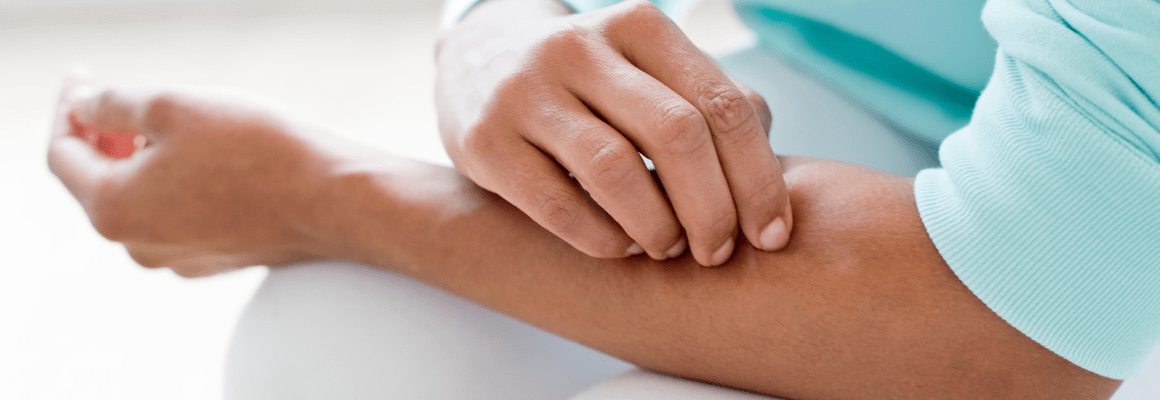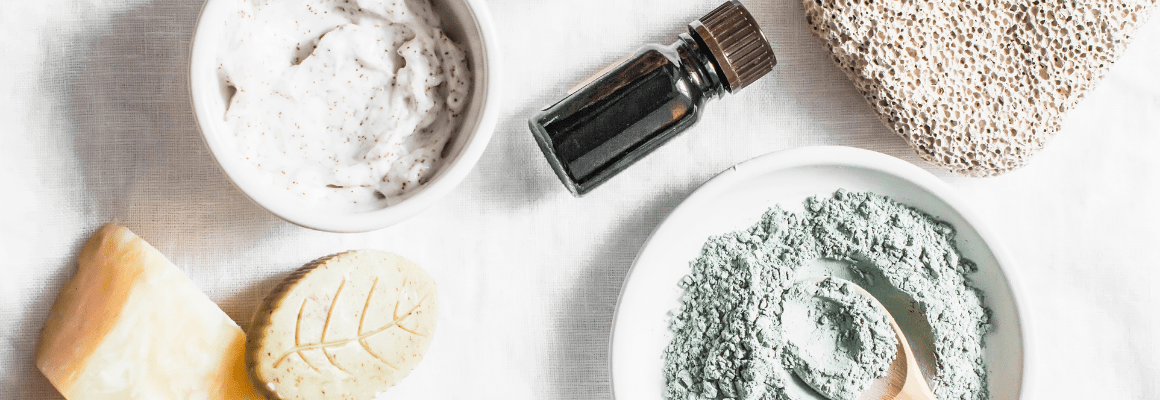Having itchy skin is one of the most uncomfortable sensations in the world. It’s highly distracting during the day when you’re trying to get on with daily tasks and it can make it difficult to get a good night’s sleep with all the tossing and turning.
Known as pruritus, suffering from constant itchy skin can lead to a variety of negative consequences including daytime fatigue, poor work or academic performance, and a decline in mood. For example, people with itchy skin may notice an increase in irritability, anxiety, and depression. This highlights the widespread effects of having itchy skin. Far more than just a physical condition, itchy skin can affect mental and emotional well-being too.
In this post, we’ll provide an overview of itchy skin, including the different causes of itching and the signs and symptoms you should watch out for. We’ll also share the best natural products and treatments you can use to find itch relief and improve your overall quality of life.
Read on to learn everything you need to know about itchy skin.
Why Do I Have Itchy Skin?
There are several different reasons why you may be dealing with itchy skin. First and foremost, one of the main reasons is having dry skin. While dry skin is a common problem for many people, the good news is that it’s usually just temporary. It’s possible to restore moisture to the skin and find itch relief with the regular use of moisturizers and some lifestyle changes.
People suffer from dry skin for a variety of reasons. One such reason is age. As the body ages, it naturally produces less oil. This is why elderly people are more likely to deal with dry skin issues compared to their younger counterparts. In fact, according to statistics, 50 percent of adults over 40 years old suffer from dry skin.
Another potential reason is the weather. Have you ever noticed that your skin tends to feel drier, and subsequently itchier, during the winter months? If so, you’re not alone. Due to cooler temperatures and lower humidity levels, there is less moisture in the air which leads to dry skin. In particular, the skin exposed to the elements, such as the hands and face, are more likely to experience increased itchiness.
Pregnant women may also notice itchier skin, particularly over their stomach area as the skin stretches to accommodate a growing baby. This is due to all the hormone changes and that the skin loses elasticity and moisture as it adapts. In addition, those who work in water-based jobs are also more susceptible to itchy skin. These jobs include nursing, hairdressing, catering, and more.
Unfortunately, this also means that you’re more likely to experience dry and itchy skin after a long, hot shower. This is because water, especially hot water, tends to dry out the skin and strip it of its natural oils.
Itchy skin can also be the result of an allergic reaction. When the skin comes into a substance it doesn’t agree with or that the immune system mistakenly identifies as harmful, it can break out in a rash. Itchiness is often a prime symptom of an allergic reaction.
Many allergic triggers can include common household objects that you likely come into contact with daily. These include cosmetics, cleaning supplies, laundry detergents, cell phones, fabrics like polyester and spandex, and anything containing nickel such as jewelry and belt buckles.
Due to the sensitive nature of the skin, people with eczema are more likely to suffer from an allergic reaction. This makes reading labels and doing patch tests first so important when trying out new products.
Finally, those with illnesses like diabetes, HIV/AIDS, and various types of cancer are also more likely to develop itchy skin. And of course, there is a connection between itchy skin and inflammatory skin conditions like eczema and psoriasis – but we’ll go into more detail on that below.
Although these are all possible reasons for itchy skin, bear in mind that everyone is different. The cause of your itching may also change with time or under certain conditions. Determining the exact cause of your itchy skin may take time.
If you’re unsure what is causing the itching, we recommend you speak to a medical professional. Your doctor or dermatologist will have a look at your symptoms to help you figure out the exact cause and determine whether any medical treatments are necessary.
Eczema and Skin Health
Eczema is an inflammatory skin condition that affects approximately 32 million people in the United States alone. While there are several different types of eczema, including contact dermatitis and seborrheic dermatitis, the most common type is atopic dermatitis. While this itchy skin condition usually develops during childhood, it does not discriminate based on age, ethnicity, or social and economic background.
The exact cause of eczema is unknown but research suggests it’s linked to a combination of genetic and environmental factors. These can include cold weather, pet fur, pollen, mold, stress, sweat, and even the food you eat. Symptoms of eczema include patches of red rashes, flakiness, dryness, and of course, itchy skin. While symptoms can develop anywhere on the body, popular spots include the hands, back, legs, and arms.
Due to a damaged skin barrier that has trouble retaining moisture, those with eczema suffer from chronically dry skin. This explains why itchy skin is one of the prime symptoms of the condition. Unfortunately, in an attempt to find itch relief, many people scratch their skin. Relentless scratching can cause the skin to crack or bleed, paving the way to infections.
How to Prevent Infections
The most obvious way to prevent infections is to stop scratching. However, we know this is easier said than done. Unfortunately, if you suffer from itchy skin, you’re likely very aware of the vicious itch-scratch cycle.
When the body experiences an itching sensation, our natural reaction is to scratch it and make it go away. But although scratching can help you find temporary relief, it can do more harm than good in the long run. Your skin may even feel itchier after scratching! This is because itch and pain have a bit of a ying-yang relationship.
Scratching triggers mild pain in your skin which temporarily distracts your brain from the itch. But when the pain subsides, the itch comes back stronger than ever. While the itch-scratch cycle is difficult to break, it’s not impossible. But it will require a lot of willpower, effort, and the excessive use of a natural moisturizer!
Best Ingredients for Natural Itch Relief
Many natural treatments can help you find relief from itchy symptoms including aloe vera, coconut oil, colloidal oatmeal, and honey. These are great natural treatments for helping soothe eczema, atopic dermatitis, contact dermatitis, and itchy skin in general. They’ve helped humans improve their skin health for hundreds of years!
All of these natural remedies offer a variety of health benefits to the skin:
- Aloe vera is known for its cooling effect which makes it highly effective at reducing inflammation and soothing itching.
- Coconut oil helps to reduce the risk of infection and manage itchy symptoms of eczema.
- Colloidal oatmeal improves skin health thanks to its powerful antioxidant properties.
- Honey is a natural moisturizer that hydrates the skin and gives it a natural glow.
You can get these natural products at your local shop and apply them directly to the affected area or you can find them as an ingredient in many natural skin care products.
Natural Skin Soothing Treatments for Itchy Skin
A great natural treatment to soothe itchy skin and manage eczema symptoms is our Organic Manuka Skin Soothing Cream. An oil-based balm, it’s made with just 6 ingredients including the powerful Manuka honey. It’s the perfect choice for those with sensitive skin, eczema, or psoriasis because it does not burn or sting.
It’s even suitable for the delicate skin of little ones. Feel free to use this natural cream anywhere on the body, including sensitive areas like the eyelids and lips. We recommend using it at least twice a day (morning and night) or anytime you wash your skin as this will help restore any lost moisture.
If you’re looking for a natural soap that won’t cause a negative reaction or strip the skin of its protective oils, check out our Coconut and Sunflower Oil Soap Bar. It offers a naturally light and clean smell and is sure to leave the skin feeling soft and smooth. For a full washing experience, it’s safe to use anywhere on the body or you can use it as a hand soap throughout the day.
Can’t decide which one you want? Why not get both? Check out our Body Care Essentials Bundle, the best natural skin care kit that includes both products.
Eczema-Friendly Scratch Protection
To find relief from itchy skin and protect the skin from scratching, we recommend eczema-friendly clothing like those from Remedywear™. Made with TENCEL and embedded with anti-inflammatory zinc, the clothing is breathable and super soft to the touch.
It also features moisture-wicking properties so you don’t need to worry about chafing or sweaty irritation. The cooling garments were specially designed to provide itch relief for people with eczema, psoriasis, and other skin conditions. The unique blend of fibers was clinically proven to reduce the severity of atopic dermatitis, reduce itching, and improve quality of sleep when worn three nights consecutively. It truly is the best eczema clothing to soothe itchy skin, protect the skin from scratching, and prevent infections.
Here are some of our favorite clothing options for eczema-prone skin:
Remedywear™ Long Sleeve Shirt for Kids
Wet or Dry Wrap Therapy
For a much-needed boost of moisture to the areas you need it most, we highly recommend wet or dry wrap therapy. This effective at-home treatment is simple yet highly effective at treating itchy skin conditions like eczema.
For wet wrap therapy:
- Apply a natural cream to the affected area.
- Cover it up with a wet piece of clothing such as these hypoallergenic bandages from Remedywear™.
- Cover up with a dry layer to allow the emollient to better permeate the skin.
Dry wrap therapy is a similar process, except without the wet layer. We recommend you leave the wrap on overnight or for a minimum of two hours. Don’t forget to apply another layer of moisturizer once you remove the wraps.










